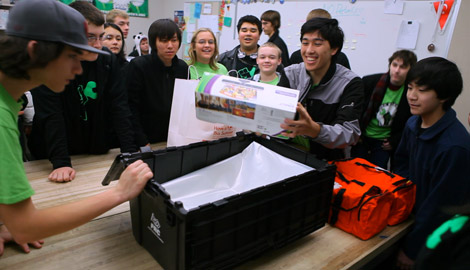Podcast: Download (Duration: 4:48 — 2.0MB)
More than 800 high school students and adult volunteers representing 38 teams from Clark County and Portland packed the house at Evergreen High School Jan. 7 to celebrate the kickoff of the 2012 FIRST Robotics Competition.FIRST, an acronym meaning “For Inspiration and Recognition of Science and Technology,” is an international program in which students have six weeks to design, build, and program a robot using parts from a standardized kit. Teams enter competition where their robots perform live action games, both autonomously and under remote control.
In 2011, more than two thousand teams competed in the United States, Canada, and Israel. This year teams in North America will compete at 52 regional events, including competitions in Seattle and Portland. Winners from those regional competitions will travel to St. Louis to compete in the world championship in April.
Last year the team with students from Washougal, Camas and Hockinson high schools, Team Mean Machine, won first place in Seattle and first place in Portland, which earned it a spot at the 2011 world competition. The team of about two dozen kids did extremely well against the incredible competition and finished in the middle of the 88-team pack (story and video here).

Members of the Evergreen High School FIRST Robotics team Green Wrenches open a kit of parts they will use to construct a robot in six weeks.
Teams praised for their dedication
Local officials and business sponsors congratulated the students for participating in FIRST Robotics during the 7:30 a.m. opening ceremony at Evergreen High School.
“At a time when most of your peers and, for that matter, my peers, are still in bed, you’re all here to take on the sort of things that are going to serve you very well in the future and are going to serve our communities really well in the future,” said Oregon state Rep. Tobias Reed.
David Madore, CEO of Vancouver–based technology company US Digital and a FIRST Robotics sponsor, encouraged the crowd to put teammates first.
“You can accomplish anything as long as you don’t care who gets the credit,” he said.
Finally, after hearing recorded messages from celebrities and technology leaders from a live video stream, the students learned this year’s game: Rebound Rumble. Teams will have to create robots that can navigate a 27-foot by 54-foot court and shoot basketballs into four different hoops, while coordinating their robots with those from other teams.
“It’s basically playing basketball with robots, so we’re going to have to think of all kinds of new ways to actually move a basketball and shoot it into hoops,” said Randy Nicholas, a team leader with the Evergreen High School FIRST Robotics team Green Wrenches. “I’m not going to get a lot of sleep, but I’m really looking forward to working with the entire team…building this really cool robot.”
While 10 of the region’s teams are new, the 2011 regional champion and national finalist Team Mean Machine from Camas hopes to have another strong season.
“I think our experience back at nationals is really going to help us because we know what to expect and how we can build our robot to compete at such a high caliber,” said team member Anna Kellogg.
Workforce development strategy
FIRST Robotics Pacific NW director Deb Mumm-Hill says the program is far more than fun and games. It is essentially a workforce development program that increases students’ interest and skills in
science, technology, engineering, and math.
“A child’s education is only going to be as strong as what they put into it and what they get out of it, and so if they’re very inspired to engage in their education and really understand math, and really understand science aspects, then they are going to be what our nation needs in the work force at the end of the day,” Mumm-Hill said. “The way that we do that is just through robotics – by making it really, really fun to apply things that they learn in the classroom.”
Running a FIRST Robotics team doesn’t come cheap. It costs $15,000 for a team to compete in a regional event alone. Teams receive some government subsidy, but the majority of their funding comes from private donations.
According to Mumm-Hill, the states of Washington and Oregon provided seed money to both veteran and rookie teams this year. The Washington State Legislature gave $600,000 dollars, while the Oregon Legislature committed $150,000, even while facing a steep budget deficit.

Keefe Koenig (left) and Henry Midles of the 2011 regional champion Team Mean Machine from Camas are ready to make another run at the national FIRST Robotics Championship in April.
“FIRST is a great investment because we turn the public dollars into a 5 to 1 turn by taking the state’s funds and leveraging them in the community by teaching the students how to go out and involve their local businesses around the FIRST team,” says Mumm-Hill.
Diversity of roles on each team
The fundraising aspect of FIRST Robotics means there is a diversity of needed roles on a team beyond the engineering or software programming. These include marketing, graphic and web design, writing, and photography.
“We write grants, we send out invitations (for businesses) to sponsor us and if they accept, then we make a second date to actually go to them and interview and bring our robot and actually show them that we are legit and serious about wanting to have them as sponsors,” said Gabbie Reiser, marketing leader for Evergreen High School’s Green Wrenches FIRST Robotics squad.
(Watch a video of the Clark County teams visiting a local sponsor.)
Professional mentors needed
Mumm-Hill says that in addition to financial support, local businesses – particularly those involved in the engineering or high tech industries – can make a dramatic impact in their future workforce by encouraging employees to serve as mentors on FIRST Robotics teams. She says 65 percent of FIRST Robotics students polled say they want to work for the companies where their team mentors are employed. That’s why a company like Boeing will have between 300 and 400 engineers and machinists volunteering on FIRST teams between Seattle and Portland.
“We bring an internship – an industry-business internship into the halls of the high school,” Mumm-Hill said. “Rather than one lucky child getting to work at US Digital or to work at Intel we can have 40 kids, but then what needs to come from industry is the people out of their cubicles into the halls of that high school to share around this robotics project what they do and where these kids can go.”
Team mentors say the support of local businesses is a solid investment in future leaders in the fields of technology and science – and the workforce of Clark County.
“If you help our team, you’re helping your future employees,” said Green Wrenches volunteer Terri Stuart Wegmann. “These kids have such a commitment because this isn’t an easy thing to do. You’re building a robot in six weeks and that’s really only a small portion of it.
CREDITS
Video shot and edited by Jordan Thompson
Voice over by Scott Thompson









